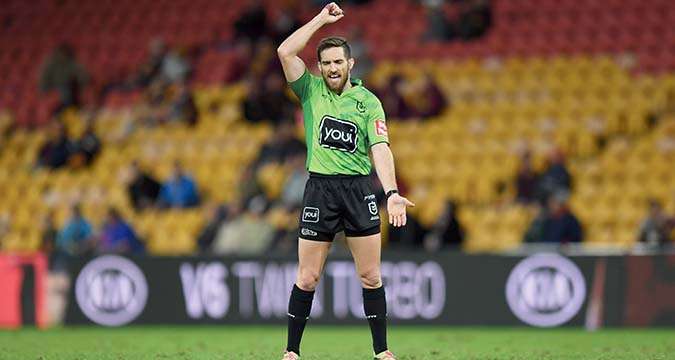
League Express completes its countdown of the significant and memorable moments for Rugby League in 2020.
Do you agree with our list? Let us know your thoughts via our League Express Mailbag.
10. NRL announces 2020 rule changes
Before it returned to action at the end of May, the NRL had been concerned by falling TV audiences in Australia, with feedback suggesting that the game was becoming too predictable for many viewers’ tastes.
Recently appointed NRL Chairman Peter V’landys decided he was going to do something about that, so he introduced a raft of rule changes that reshaped the game dramatically, notably the six-again rule, which was introduced to generate more free-flowing and unstructured Rugby League, while he also initiated the return to a single referee after several years with two referees on the field in NRL matches.
The NRL also introduced a captain’s challenge system for general play, whereby a referee’s decision could be challenged during a game, although a failed challenge would lose the right to challenge for the rest of the game. And the new rules also gave teams the choice of where to pack scrums on the field.
The most ineffective introduction was the 20/40 kick, which was executed zero times last season.
By the time the Super League season got back under way in August, the six-again rule was deemed such a success in the NRL that it was also adopted in the northern hemisphere.

9. RFL negotiates a government loan of £16 million
After the suspension of the season in March, many Rugby League clubs faced liquidity problems that could have threatened their existence.
But on 1st May the RFL revealed that it had negotiated a £16 million emergency loan from the government, which was a welcome lifeline for the game.
Rugby League was the first sport to receive such assistance from the government and it was intended to help safeguard the immediate future of the game.
The money was a loan, not a grant, but it came as a huge boost for the game as clubs at all levels had been left feeling the effects of the Covid-19 outbreak.
Culture secretary Oliver Dowden (pictured) said: “This is a massive shot in the arm to secure the survival of Rugby League.
“We recognise that many RFL clubs operate on very tight financial margins. Without their ability to stage matches with spectators and despite the Government’s extensive economic package, the professional game has come very close to collapsing.
“From my first sports visit as Secretary of State to Leigh Centurions, I could see how important these clubs are to the communities they serve. They are the beating heart of their towns and cities, and their impact goes far beyond what happens on the pitch.”
Later in the year the RFL negotiated another £12 million loan from the government.
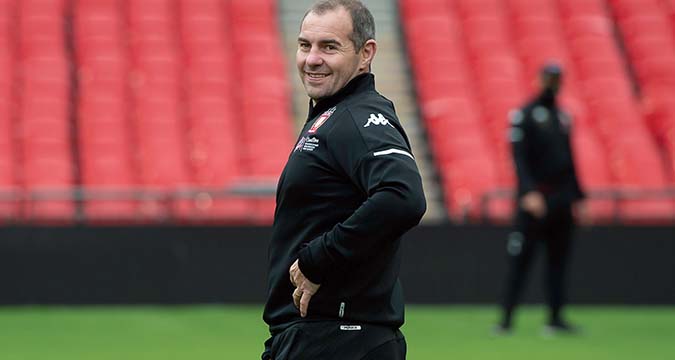
8. Huddersfield Giants sign Ian Watson
One of the most significant coaching moves for many years was announced on 19 November when Huddersfield Giants confirmed reports that they had signed Ian Watson, who had taken Salford Red Devils to the Grand Final in 2019 and to the Challenge Cup Final in 2020.
Watson signed a three-year contract with the Giants after spending six seasons with the Red Devils, where he also guided them to a memorable Million Pound Game victory in 2016 against Hull Kingston Rovers before starting the ascent up the league, while overcoming lower budgets than their rivals and the annual loss of their top players.
In the same period the Giants, who won the League Leaders’ Shield in 2013, had failed to back up that success, frequently failing to make the play-offs. They are now hoping that the appointment of Watson will see them as major contenders.
“I was attracted to the potential of the club,” Watson said.
“Everything about it screams top four; the stadium, the youth academy with the kids that can be brought through and the owner of the club, who has proven over time that he wants to win and has backed the club in his pursuit of success. The longer-term aim has to be challenging the top teams in Super League.”
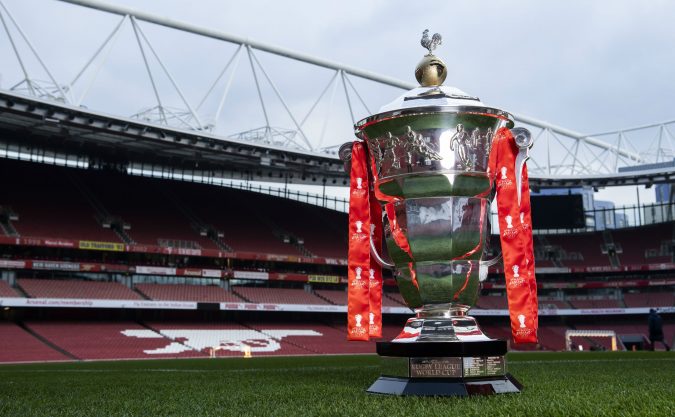
7. World Cup fixtures and venues revealed
On 21 July last year, the Rugby League World Cup team released the full fixture list for this year’s tournament, revealing that hosts England will take on Samoa at St James’ Park, Newcastle on October 23.
There were 61 fixtures revealed to be played over six weeks, not just for the men’s event but also the wheelchair and women’s competitions.
The women’s tournament would begin on November 9 at Leeds’ Emerald Headingley Stadium and the wheelchair tournament would begin with a double-header at the iconic Copper Box in London on November 11.
In another first for the tournament, it was revealed that Arsenal FC’s home, the Emirates Stadium, will host a sport other than football for the first time when it stages the second men’s semi-final on November 20, while Old Trafford will create further Rugby League history by staging the men’s and women’s double-header final on November 27.
The opening day of the 16-team men’s tournament features not only England but also the current holders Australia, who will face Fiji in a repeat of the 2017 semi-final at the KCOM Stadium in Hull.
And in the women’s tournament, newcomers the Brazil Amazonas will face England in what is likely to be a carnival atmosphere at Emerald Headingley Stadium in the opening match.
Jon Dutton, RLWC2021 Chief Executive, said: “This is a huge moment for the tournament and for fans across the world as we reveal the full fixture schedule.
“RLWC2021 will bring together the very best that the sport has to offer, and you can see from the schedule there are world class, compelling matches, across all three tournaments.”
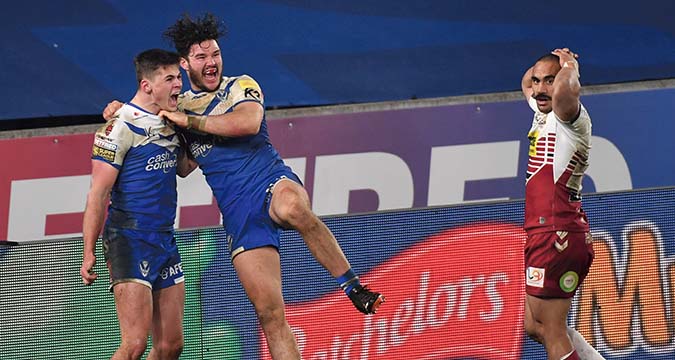
6. St Helens win the Grand Final in the last minute
St Helens won the most extraordinary Grand Final in Super League history at Hull’s KCOM Stadium on 27 November, defeating their arch-rivals Wigan 8-4 with a try by Jack Welsby as he followed up Tommy Makinson’s attempted field-goal.
The 2020 Grand Final was historic for several reasons. It was the first Grand Final not to be played at Old Trafford; it was the first Grand Final to be played without a crowd in attendance; it was the final game before they retired for two legends of the game, in St Helens’ James Graham and Wigan captain Sean O’Loughlin; it was the first Grand Final to be played in November; it was the first Grand Final to be decided with a try in the very final second of the game; and last but not least, St Helens captain James Roby became the oldest winner of the Harry Sunderland Trophy, having celebrated his 35th birthday a few days before the Grand Final.
With just minutes remaining the sides were locked at 4-4, with golden point looking likely. But the scales tipped towards Wigan when they were awarded a penalty, but Zak Hardaker’s kick went agonisingly wide but not dead, and Saints ran up the field to register an incredible try as the final hooter sounded.
As Tommy Makinson’s attempted drop-goal appeared to be hitting the target, the 19-year-old Welsby sprinted 40 metres to put pressure on Wigan’s Bevan French under the posts. And Welsby’s determination was rewarded as the bounce fooled French, with the youngster on hand to ground the ball.
It was an extraordinary emotional moment, and none more so than for James Graham, who had been in many losing Grand Final teams for both St Helens and the NRL’s Canterbury Bulldogs, but who retired on the highest of notes.
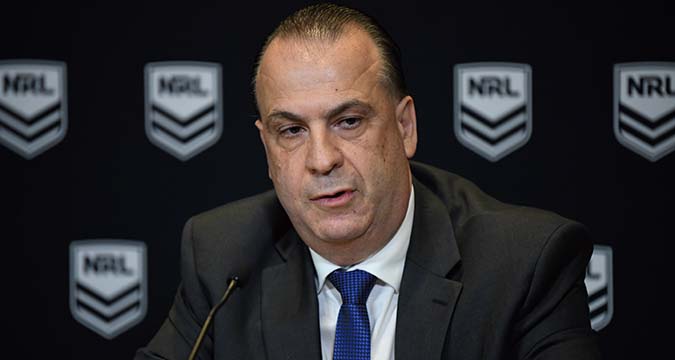
5. NRL decides to restart the season on 28 May
On 9th April the Australian Rugby League Commission confirmed that the NRL intended to restart its competition on 28 May, which would be more than two months after it had closed down the season after only two rounds in March.
The ARL commissioner, Wayne Pearce, confirmed the intention to get the league back under way seven weeks later, signalling the NRL’s intention to be the world’s first major professional footballing code to get back to regular action after the arrival of the Covid pandemic.
The announcement came just hours after Channel Nine aimed a scathing broadside at the league, accusing it of “mismanagement” and squandering millions of dollars over a number of years. And it’s fair to say that the announcement encountered a lot of scepticism from leading figures in Australia, with Sydney Morning Herald columnist Peter Fitzsimons pouring scorn on the idea.
“Essentially, the NRL chair Peter V’landys is arguing the case of Rugby League exceptionalism, that the social isolation rules that apply to everyone else should not apply to them,” wrote Fitzsimons.
But V’landys (pictured) proved that he could deliver on his promise, which had been made as the NRL clubs faced a financial catastrophe if the game didn’t resume quickly.
Broadcasting rights co-holder Channel Nine had criticised the NRL’s handling of the coronavirus crisis and had threatened to pull out of its contract.
But Pearce insisted that the NRL was still planning to work with Nine for the rest of the season and honour the $1.8bn deal signed with the broadcaster and Foxtel in 2015.
“They’re a key partner for us and we intend to fulfil our contractual obligations. We hope to maintain a working relationship that will work for both parties,” he said.
It’s fair to say that if the NRL hadn’t returned to action so quickly, then the consequences for the 16 clubs could have been fatal.
ARLC chairman Peter V’landys apologised to the network, who were understood to be furious with being left out of talks focused on restarting the season.
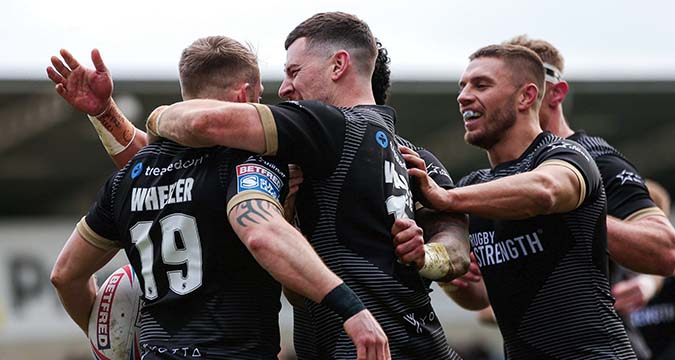
4. Super League refuses to reinstate Toronto
On 2nd November Super League released a statement that shattered the hopes of all those in the game who had hoped that Rugby League’s expansion into North America could at last see the game breaking free of its heartland along the M62 corridor.
Following its decision not to complete the 2020 season, the Wolfpack had applied to re-enter Super League in 2021 under a new owner, the Toronto based businessman Carlo LiVolsi. But, after three years of stunning success, with the club playing in front of crowds near to five figures at Toronto’s Lamport Stadium, the Super League clubs turned their backs on the advantages that expansion into Canada could have brought.
“The Super League Board has rejected Toronto Wolfpack’s application to return to the competition in 2021,” said Super League’s statement.
“The Board considered a number of factors following the Wolfpack’s inability to complete the 2020 Betfred Super League season and after the club’s owner, David Argyle, stepped down from the organisation ahead of the season restart in August.
“Following a review in September of the club’s unsatisfactory first bid for re-inclusion, Super League granted a four-week extension, partly at the request of the club’s prospective new owner, Carlo LiVolsi, to improve its submission.
“In that period, Super League also commissioned its own independent research into the commercial opportunities available to Rugby League in Canada at this current time or in the foreseeable future.”
There was plenty of criticism of this decision, but Super League Executive Chairman Robert Elstone was insistent that the panel that had written a report on Toronto had all agreed with the decision it had made.
“Its findings were unanimous – that operating a team in a fiercely competitive North American sports market was non-strategic and added no material incremental revenue to Super League in the short or medium term,” said Elstone.
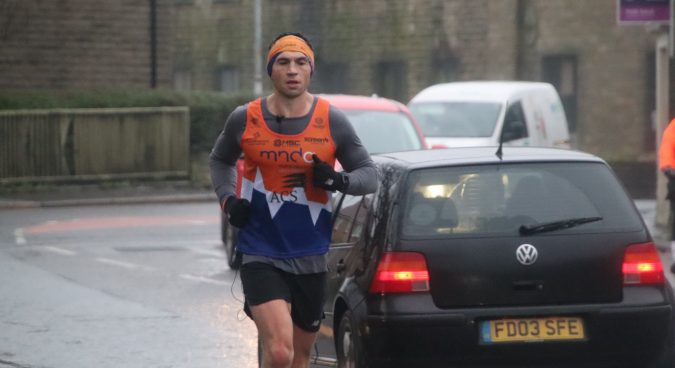
3. Kevin Sinfield’s seven marathons for Rob Burrow
At the beginning of December Kevin Sinfield completed seven marathons in seven days to raise funds for his former team-mate Rob Burrow and for the Motor Neurone Disease Association.
After completing the last of them, Sinfield said it was the greatest achievement of his life to help his friend Burrow and others suffering from the disease.
He had originally taken on the challenge in the hope of raising £77,777, but that figure was easily surpassed as people from all walks of life contributed to the cause and he ended up raising more than £2.5 million, with all major news outlets covering his feat.
“The support has been incredible, but this is all about Rob and a group of friends and team-mates who had wonderful times together; now one has hit a rough patch and we’re coming out to help,” said Sinfield.
“Sometimes, you just need to help a mate, and that’s what we’re trying to do. In its simplest terms, we’ve been on seven runs. I’m really proud of the team, they’ve been outstanding.
“I’ve heard so many different stories of how horrific this disease is, I knew how cruel it was anyway and seen it first hand with Rob over the last eleven months, but this amount of money will make a huge difference and change a lot of things hopefully.”
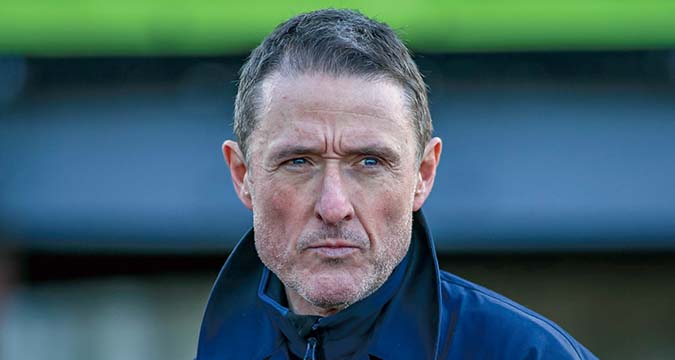
2. RFL announces suspension of season
On Monday 16 March the RFL and Super League jointly announced a suspension of fixtures, initially until 3rd April, “during which time the season’s structure and fixture rescheduling will be considered”.
The decision was made in accordance with government advice on cutting down social contact and mass gatherings.
The Super League clubs discussed a range of contingency plans with the RFL at their board meeting in Huddersfield, and the situation would be reviewed with broadcasters and sponsors throughout the initial suspension.
The suspension was to apply to all competitions, and the implications would be discussed at meetings of Championship and League 1 clubs and the community board in the succeeding days.
A joint statement from Robert Elstone, the Executive Chairman of Super League Europe, and Ralph Rimmer, the CEO of Rugby Football League, said: “These are unprecedented times, and they present significant financial and commercial implications for Rugby League, which will be further considered during the period of suspension.
“Super League is also an international competition, and consideration has to be given to our clubs in Canada and France, particularly around travel restrictions and scheduling fixtures.
“Player welfare and maintaining the integrity of the competition are key concerns moving forward. Equally our responsibilities to Rugby League communities remain front of mind for all of us.
“The whole country is facing major challenges – and the support of our fans, partners and stakeholders is needed now more than ever before.”
As it turned out, Super League would not return until 2nd August, while the Championship, League 1 and the community game were suspended for the rest of the 2020 season.
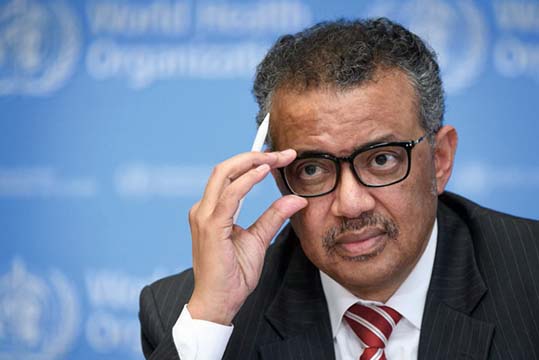
1. World Health Organisation declares a global pandemic
The major issue affecting Rugby League during 2020 was undoubtedly the Coronavirus pandemic.
The outbreak was labelled as a pandemic by the World Health Organisation (WHO) on 11 March, a date that was criticised in some quarters for being too late to react when the virus had already taken a firm hold in many countries. The first person now known to have tested positive for the virus was a 75-year-old Nottinghamshire woman who was tested on 21 February and subsequently died of the disease.
On 11 March WHO chief Dr Tedros Adhanom Ghebreyesus (pictured) said that the number of cases outside China had increased 13-fold in two weeks. He said he was “deeply concerned” by “alarming levels of inaction”.
He called on governments to change the course of the outbreak by taking “urgent and aggressive action”.
Governments had to “strike a fine balance between protecting health, minimising disruption and respecting human rights”.
“We’re in this together to do the right things with calm and protect the citizens of the world. It’s doable,” he said.
Sporting bodies around the world reacted by closing down their competitions, with the last Super League game being played on 15 March.
Prime Minister Boris Johnson announced the first national lockdown on 23 March, asking people to stay at home in order to ease pressure on the NHS.
As it turned out, the Super League competition would be dormant for four and a half months, returning on 2nd August, while the NRL was able to return on 28 May.
It was a season like no other in Rugby League history.
The above content is also available in the regular weekly edition of League Express, on newsstands every Monday in the UK and as a digital download. Click here for more details.
Read the other parts of this feature:
